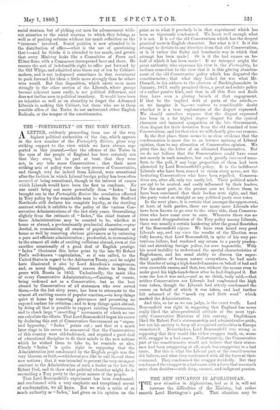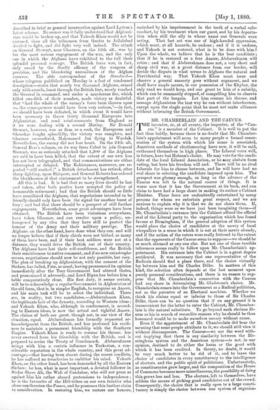THE NEW SITUATION IN AFGHANISTAN. THE new situation in Afghanistan,
bad as it is, will not increase the difficulties of the Ministry, but rather smooth Lord Hartington's path. That situation may be
described in brief as general insurrection against Lord Lytton's latest scheme. No sooner was it fully understood that Afghani- stan would be broken up, and that Yakoob Khan would not be restored, than all the tribesmen from Quetta to Jellalabad decided to fight, and did fight very well indeed. The attack on General Stewart, near Ghuznee, on the 19th ult., was by far the most serious engagement of the war, and the only one in which the Afghans have exhibited to the full their splendid personal courage. The British force was, in fact, only saved by the deadly efficacy of the weapons of precision, and the blundering unreadiness of the Afghan
reserves. The able correspondent of the Standard—
whose telegram published on Monday is a feat of condensed description—states that nearly ten thousand Afghans, armed only with swords, burst through the British line, nearly reached the General in command, and under a murderous fire, which killed one-fifth of their number, made victory so doubtful, that "had the whole of the enemy's force been thrown upon us, the consequences would have been very serious,"—in fact, we should have been defeated, in which event it would have been necessary to throw thirty thousand Europeans into Afghanistan, and send reinforcements from England as if we were dealing with a second Mutiny. Sir Donald
Stewart, however, was as firm as a rock, the Europeans and
Glioorkas fought splendidly, the victory was complete, and Ghuznee surrendered, Mahommed Jan flying to Wardak.
Nevertheless, the enemy did not lose heart. On the 24th ult.
General Ross's column, on its way from Cabul to join General Stewart, was so seriously attacked that 1,200 of the Afghans are said to have been killed, that the extent of our own loss has not been telegraphed, and that communications are either intercepted or delayed. The Kohistanees, moreover, are re- ported "still excited ;" a British detachment has retired, after sharp fighting, upon Shirpore, and General Roberts has ordered the blockhouses of that cantonment to be strengthened.
All this is bad. It is bad that so many lives should be lost and taken, after both parties have accepted the policy of honourable retirement ; bad that the British should so little have conciliated the Afghans, that negotiations intended to be friendly should only have been the signal for another burst of fury ; and bad that there should be a prospect of still further engagements. Nevertheless, some great advantages have been
obtained. The British have been victorious everywhere, have taken Chuznee, and can resolve upon a policy, un- hampered by any idea that they have still to protect the honour of the Army and their military prestige. The Afghans, on the other hand, have done what they can, and will no longer believe that if their chiefs were not bribed, as many of them have been, and if their best soldiers were not at a distance, they would drive the British out of their country. The Afghans have lost their self-confidence, and the British their sensitiveness to native comment, and if no new catastrophe occurs, negotiations should now be not only possible, but easy. The plan of breaking up Afghanistan, with the consent of the Sirdars, has failed, Fate, as usual, having pronounced its opinion immediately after the Tory Government had uttered theirs, and pronounced it adversely, and Lord Ripon has before him a table comparatively clear. His first duty, it seems certain, will be to acknowledge a regular Government in Afghanistan of the old form, that is, in simpler English, to recognise an Ameer, and his main task will be to select the individual. There are, in reality, but two candidates,—Abdurrahman Khan, the legitimate heir of the dynasty, according to Western ideas ; and Yakoob Khan, who, although in confinement, is accord- ing to Eastern ideas, is now the actual and rightful Ameer. The claims of both are great, though not, in our view of the situation, equal. Abdurrahman has formally requested ac- knowledgment from the British, and has professed his readi- ness to maintain a permanent friendship with the Southern Empire. Yakoob Khan is ready to resume his throne. has never swerved from his friendship with the British, and is prepared to revise the Treaty of Gundamuck. Abdurrahman brings with him a certain influence in Turkestan, a con- siderable reputation in the whole country, and this great ad- vantage,—that having been absent during the recent conflicts, he has suffered no treacheries to embitter his mind. Yakoob Khan, on the other hand, has been demanded by all the Eastern Sirdars ; he has, what is most important, a devoted follower in Sirdar Shere Ali, the Wali of Candahar, who will not press as against him his rather absurd pretensions to independence ; he is the favourite of the Hill-tribes on our own frontier who alone can threaten the Passes, and he possesses this further claim to consideration. In restoring him, we restore our honour,
smirched by his imprisonment in the teeth of a verbal safe- conduct, by his treatment when our guest, and by his deporta- tion when still the ally in whose name our Generals were acting. That last act was one of high-handed oppression, which must, at all hazards, be undone ; and if it is undone, and Yakoob is not restored, what is to be done with him ? Upon the whole, we believe that he is the best candidate ; that if he is restored as a free Ameer, Abdurrahman will retire ; and that if Abdurrahman does not, a very short and sharp civil war, at a great distance from our border, will decide the dispute in what seems to Afghans the natural and Providential way. That Yakoob Khan must issue and observe a general amnesty goes without argument, and we shall have ample means, in our possession of the Khyber, the only road we would keep, and our grant to him of a subsidy, which can be summarily stopped, of compelling him to observe that part of the bargain. Let him resume his throne, and manage Afghanistan the best way he can without interference, except upon the single point that he must not make alliances without informing the British Government.



































 Previous page
Previous page